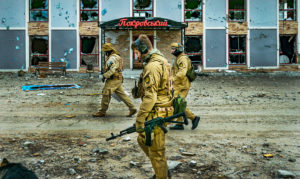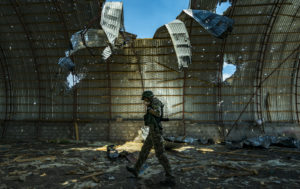“You better stay out of our country. The more Russians you send to Ukraine, the more of them we will kill, and the more death you will bring back to your homes.” Nataliya Zubar, native of Ukraine’s second city, Kharkiv, and documenter of Russian war crimes, is giving me her message to Moscow, which over the last 48 hours has seen the Ukrainian army smash through much of the territory it conquered in the north-eastern Kharkiv Oblast
She continues: “We didn’t just liberate one village at a time, but in one big sweep. It was brilliantly done by our army. We are collecting lots of Russian equipment from the field. It’s amazing what we are finding — it’s all so outdated: Seventies-era electronic equipment built when I was toddler. We even found a notebook that contained the medical records of a Russian regiment, and it was like my primary school notebook from 1972.”
She pauses, lost in thought for just a second. “It was through this notebook that I finally understood how the Russians lost so badly. The regiment has hundreds of soldiers, and there was not a single complaint or registered ailment. Not one. That’s impossible. The soldiers were clearly told to feed bullshit to the doctors, which created an internal line of bullshit. That bullshit was then reported to their superiors, who fed that bullshit up to central command. So they got a totally fake view of the front.”
So Russian forces on the northeastern front were brought down by a combination of Ukrainian skill and Russian bullshit? “Exactly.”
***
Yesterday marked the 200th day of the war, and if last week saw intense fighting around the country’s second city of Kharkiv in the northeast, just 40km from the Russian border, the weekend saw it turn into something more like a mass Russian retreat.
Ukraine has now retaken the logistics base of Izyum — the biggest defeat for Moscow since it failed to take Kyiv. Zelenskyy claims Ukraine has retaken 30 settlements and 2,000 square kilometres since the counteroffensive began. The Institute of War suggests this could be as high as 2500 square kilometres.
Nataliya was right. It’s a clear victory for Ukrainian strategy. Around two weeks ago, Kyiv stepped up its shelling of the Russian-controlled Kherson region in the country’s south. This, commentators agreed, was the arrival of the long-expected Ukrainian counter offensive. Kyiv kept striking the south and then suddenly, three days ago, they attacked the Kharkiv region in the northeast, catching the Russians off guard.
And they are clearly still in shock. Watching Russia’s channels over the last 24 hours reveals two trends. The first is that talk of “Ukrainian Nazis” has decreased — instead it’s now about “shared past and history” of two nations. Second, they simply cannot accept they’re losing to Ukrainians; instead, they talk about fighting a huge force of British and American soldiers, or as they often call them: “Anglo-Saxons”.
If that is typical of their information operations online, in the field they are also behaving as expected. Taking a hammering in the field, its forces are retaliating like they always do: targeting civilians. Pro-Ukraine TV channels yesterday morning were filled with images of Russian strikes on homes in Dnipro and Mykolaiv. So the war evolves, but also remains the same. Ukrainians continue to have to dig in. As Zubar told me: “I absolutely do not tolerate hot weather. I’m glad summer is over. On we go.”
***
“It’s fucking chaos.” The voice is muffled but alert; and pregnant with humour, as it always is. “But then again it’s been chaos since 24 February.” There’s a pause. Then a short, staccato laugh, or maybe it’s interference. The mobile signal comes and goes, which is disconcerting: whenever my friend – let’s call him Ivan – who is in a village in the southern Kherson region, goes silent, I worry that he’s been bombed or shelled.
“At least it’s good chaos this time,” Ivan continues. In and around what are officially called the temporarily controlled territories (TCTs), they have taken note of recent events. Kyiv fastidiously avoids the term “Occupation” because it carries legal responsibilities, and assumes a degree of permanence — as with, say, Turkey’s occupation of northern Cyprus. The Ukrainians (and indeed the Brits and Americans) will not afford Moscow the same recognition. Ivan, though, doesn’t care what his former home is called, as long as the army takes it back soon.
When the Russians rolled in during the first days of the war, he knew it was time to make himself scarce. He was too loud, too outspoken, too irretrievably pro-Ukrainian. “Oh, they’d have executed me straight away,” he told me back then with a laugh.
Now he’s bullish. “I’ve been watching what is happening in Kharkiv nonstop for the last 24 hours, man — I haven’t slept. And it’s good here, too. Every day I hear our artillery and guns. It’s like music to my ears, man. Every time I hear a rocket, I imagine it landing on these Russian fucks. I’ve got nothing else to do these days but wait — and dream.”
Amid the euphoria over Ukraine’s success in Kharkiv, it is the south that remains vital to the war. It is here that you find what is left of Ukraine’s coastline and access to Crimea. Kherson was the first major Ukrainian city captured by the Russians during their southern Ukraine offensive in the first days of the war. Since early March, the Oblast has been under de facto Moscow control. It is here that the outcome of the war will be decided.
Oleksiy Arestovych, a Senior Presidential Advisor, says Ukrainian forces have already “liberated several settlements on the western bank of the Dnieper” in the south-east. Over the past few days, Ukraine has also targeted the Antonovsky bridge near Kherson city, while Ukraine southern command claims it hit an ammunition depot and a Russian army control centre near the city.
In truth, these strikes followed weeks of sustained Ukrainian action in the area as Kyiv targeted infrastructure, supply lines and depots, ammunition storage sites, bridges and convoys. It’s called shaping the battlefield and artillery is the key to it. The goal is to discombobulate the enemy, making them “lose their initiative, coherence and force them to fight a disorganised battle”. All of this speaks to a broader truth. The Ukrainians are facing a far larger enemy, with far more men and cash and resources. On paper they should have folded after just a few days, as Putin’s flunkies told him they would.
But in this war Ukraine has two advantages. The first is Western support. Last week, I heard from “Petya”, a soldier fighting in the Kherson region. He was clear, as Ukrainians are always clear on this point: the offensive was going well, but for it to succeed it needs continuing and increasing Western assistance. “The help of our Western allies is vital,” Petya said. “We lacked artillery shells and armaments. But [thanks to the West] we now have new shells, new armaments. These help us to level the playing field with the Russians.”
Western aid is the lifeblood of the Ukrainian war effort. Kyiv needs to ensure it keeps coming, which means that it must be creative, not just on the battlefield but also online. In an age where the public sphere is dominated by large social media platforms, no properly run military campaign — especially one relying on foreign support — can do without a social media strategy. And as the counteroffensive has expanded, so has the number of videos emerging from the battlefields of Ukraine.
Russia has its own online narrative, of course: mainly about the offensive being a failure and the Ukrainians losing lots of men. Its military bloggers are relentless. The latest “reports” are that 20 Russian soldiers recently killed 400 Ukrainians, but nonetheless may have to “step back”. Meanwhile, Ukrainians are bringing in 100,000 new troops, all under the “influence of narcotics”. It’s laughable but it has a constituency — it is them, not us, whom this nonsense is aimed at.
If Western support is one advantage enjoyed by Ukraine, the second is something more intangible, but also something that no successful national defence can do without: morale. The Russian army consists largely of conscripts who don’t want to be there (and in many cases weren’t even told they were marching off to war). Ukrainians, conversely, are fighting for their land. And after the atrocities the Russians have committed in conquered towns like Bucha, the hatred and revulsion for Moscow across Ukraine is now near universal.
But as well as fighting for their homeland, the Ukrainians are fighting for something much deeper: the essence of their nation. Russia doesn’t just want their land; it wants their identity. Moscow claims there is no such thing as Ukraine. The very idea is a category error, a mistake of both logic and history that it seeks to correct through genocide.
Back in May I travelled to the Western city of Lviv. Close to the Polish border, far, far from Russkiy mir, both geographically and culturally, Lviv was and is the heartland of Ukrainian national feeling; it is from here that most of its modern independence movements have sprung. There I met the Ukrainian thinker and writer, Yevhen Hlibovytsky.
Sitting in a café, he outlined his view of the situation. “Ukraine was conceived in 1991, but it wasn’t born in 1991,” he told me, referring to its official independence from the Soviet Union. “91% of Ukrainians voted yes [to independence]. But they did not actually vote for a clear vision of what Ukraine would be. What they voted for was a system that rejected totalitarianism.” He is not the only one who believes this. Across the country, people told me the same thing and it drives their resistance, often under the most dangerous of circumstances. Understand this fact and understand how the counteroffensive — and indeed the war — might be won.
From pro-Ukrainian graffiti to posters targeting collaborators, including bombing them, resistance inside the TCTs has been fierce and consistent. Things are getting harder. As conditions worsen, more people leave, and the pool of potential recruits shrinks. But Petya is in no doubt: right now, resistance activities are integral to the counteroffensive. “A lot of things depend on intelligence,” he says. “This means not only using some techniques for reconnaissance but also working with people in the occupied territories who give us necessary information to help with our shelling, targeting fire — or simply destroying [our] enemies.”
Ukrainians in the TCT are busy undermining Russian forces by any means possible. They reportedly stab Russian soldiers; give their coordinates to the Ukrainian army, and have begun to fly drones into Kherson to spot enemy targets for their military.
It reminds me of something else Hlibovytsky told me back in Lviv. “It was obvious that Ukraine will not fold,” he said. “The Western view is overly institutional. What they’re trying to assess is the quality of our institutions. Infrastructure-wise we’re around 50. Human capital wise, we’re around 150. That’s the point. You have to look at cultural issues, you have to look at people.”
Will they succeed? The war is not going to end any time soon. On the first day of the counteroffensive, Zelenskyy told Russian soldiers to “run for their lives”. But beyond the rhetoric — and the dazzling successes in Kharkiv — Kyiv has warned that the battle to retake the Kherson Oblast will be slow. And Russia is determined, too. For Ukraine, this struggle is about nationhood; for Russia, it’s about something equally fundamental: the promulgation of empire. Putin recently approved a 31-page foreign policy doctrine with broad aims to “protect and advance the values and interests of the Russian World”, specifically to “preserve its cultural and civilisational diversity”. Putin may act like a 19th-century Tsar, but to justify his actions he knows he needs to talk like a 21st-century HR manager.
Then there is the broader political context to all this — not least EU dependence on Russian energy. Soon, winter will be here. Everyone was content to pin the blue and yellow flag to their profiles and drool over Zelenskyy in spring and summer. It all looks very different now.
This is, of course, what Moscow is banking on. The West’s enemies have long seen our toddler-like attention span as one of our most exploitable weaknesses. Just hold out, goes the thinking in the Kremlin. Just hold out for the gas bills to do their work. Just hold out for German industry to start lobbying Berlin for Russian sanctions relief. Just hold out — and watch the money start flowing again.
These facts are not lost on Ukrainians. Recently, Kyiv’s First Lady, Olena Zelenska pointed out that while many in Europe are “counting pennies, we count our casualties.” Prices in Ukraine, she added, “are going up as well… in addition [to] our people getting killed”. On the ground, the truth of all this is inescapable to Petya. “Is it possible for Ukraine to push back Russia?” he says. “I think it is, but it needs two things. First, strengthening sanctions against Russia to undermine their own power, especially targeting their oil and gas industries. Second, aid for the Ukraine military — aid with reparations, armament, and new types of arms, especially attack arms. This means tanks, planes, and plenty of aircraft and artillery. Especially artillery.”
From deep inside Kherson, Ivan remains hopeful. “Eventually we will chuck these fucks out of our land. It’s just a question of how long it will take — and how many have to die before that happens.”
Disclaimer
Some of the posts we share are controversial and we do not necessarily agree with them in the whole extend. Sometimes we agree with the content or part of it but we do not agree with the narration or language. Nevertheless we find them somehow interesting, valuable and/or informative or we share them, because we strongly believe in freedom of speech, free press and journalism. We strongly encourage you to have a critical approach to all the content, do your own research and analysis to build your own opinion.
We would be glad to have your feedback.
Source: UnHerd Read the original article here: https://unherd.com/




